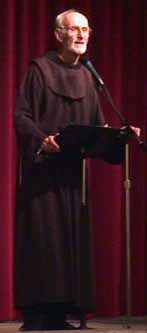
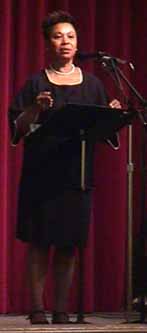


Saturday there was a big conference of at St. Boniface Church in San Francisco. The opening ceremony was done by Black Star, who played some Native American flute music. She was followed by comments from Father Louis Vitale (whose church we were in), who explained that St. Boniface was a Franciscan Church, named after the order of monks founded by St. Francis, whom the city of San Francisco is also named after. He was followed onto the stage by Congresswoman Barbara Lee (9thCD). She talked about how things have changed on Capitol Hill since the historic occasion when she cast the only vote against Bush right after 9/11. She is now able to get many cosponsors for legislation. Lee encouraged us to live up to the name of our event in every way possible, and to make the most of our time together.
From there it was a multi track program. I followed the oil track, but there was also a human rights track, a nuclear weapons track, and a few other breakout sessions I didn't pay much attention to. For more information on the conference in general, please visit www.envirosagainstwar.org.
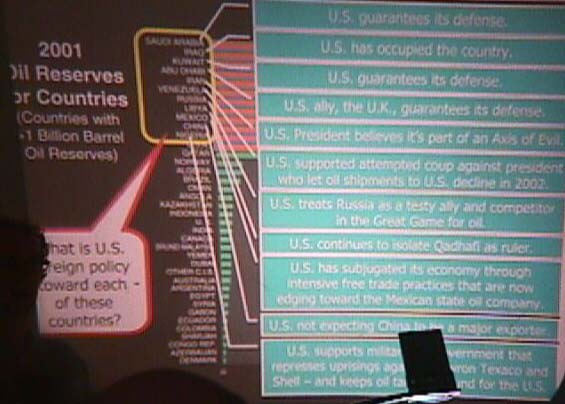
The first oil panel did a good job of laying out the scope of the problem. The speaker from AmazonWatch.org pointed out that a lot of the destruction caused by the oil economy happens in places where it is hard for most people to see it. He listed some of them. Habitat destruction to create access to crude. Pollution caused by dumping byproducts of refining. Farmland destruction to create suburbs. Climate change at the retail level. He showed a chart of the countries with the largest proven reserves of petroleum, and all of them are places that have been on the front page of the newspaper in ugly ways many times in the past few decades. Among them, only China was not expected to become a major oil exporter. He was followed by a Native-SouthAmerican who talked (in Spanish) about what it felt like to live in the kind of war zone that was created by the big international oil companies in places where they had no respect for the indigenous people. It sounded very bad.
Dr. Henry Clark, who has been organizing resistance to Chevron's refinery in Richmond for many years, talked about all the cancer clusters his community has, and how hard it is to get the oil industry executives to stop polluting. He pointed out that the only thing that that seemed to work reliably was to respond with a helping hand when elected politicians were directly affected by the problem. His example was a toxic gas release that sent thousands of people to the hospital, including several members of the City Council. Only after that happened was it possible to put in place a warning system to urge people to seek sealed shelter when such accidents occurred.
The lunch was very yummy vegetarian food.
After lunch I attended a panel about progress towards demilitarization. One speaker talked about how military bases are a very inefficient way to get jobs into an area. He also pointed out that the San Francisco bay area is one place where there are a lot less military bases then there used to be. A Vietnam Vet who organizes in the Hunters Point area talked about how the Navy left behind a very toxic legacy. He brought up his young relatives born with birth defects. It is clear that the more generations people spend around the toxic soup, the weaker they become. Now kids are being born with parts of their hearts missing, whereas a generation ago the problems were much less severe, but still bad. A young Filipino talked about how hard it is to keep the US Navy out of her homeland. Another guy talked about how the US Army had been testing chemical weapons on Panamanians without their knowledge or consent, and how that had shaped our relationship with Panama since the Panama Canal Treaty expired. A woman from PeaceAction talked about how her organization is trying to build awareness that our policy needs to change by posting ads like the one above in the subways of DC, and other cities as funding becomes available.
There was a final panel about solutions to the oil problem. A woman from Literacy for the Environment said that getting kids involved with the struggle early was very important. Jason from the Berkeley Environmental Center (BEC) talked about biodiesel, and what a great piece of the solution that was. A guy in the audience that used to work for GreenPeace talked about how conservation is still a huge piece of the solution. Beck from BEC talked about how important it is to know the many ways that oil touches everybody's life. She handed out fliers that told the story at the global, community, and personal level. For some reason she had left the ones about how it touches the home behind.
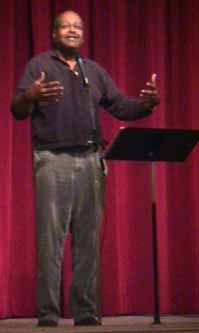
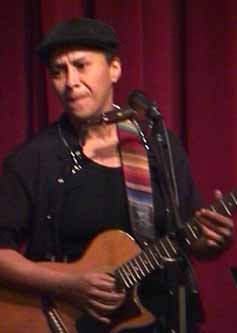
The closing keynote speech was given by Wilson Riles Jr., who talked about how traditionally in California we have always gotten a lot of people involved with something by going through the mainstream media. He explained that in this new world where the major information channels are owned by such companies as Clear Channel and General Electric, this is no longer possible. We need to find ways to connect with other people by engaging our hearts and our heads and getting out and talking to them. He wished us the best of luck with it.
The day was capped by music from Faith Nolan and Mokai. Faith Nolan led us in some bluesy sing-along type stuff. Mokai sounded good accompanied by organic California wine and munchies.
Tian Harter
I shook hands with Barbara Lee after she spoke at the beginning of the day.